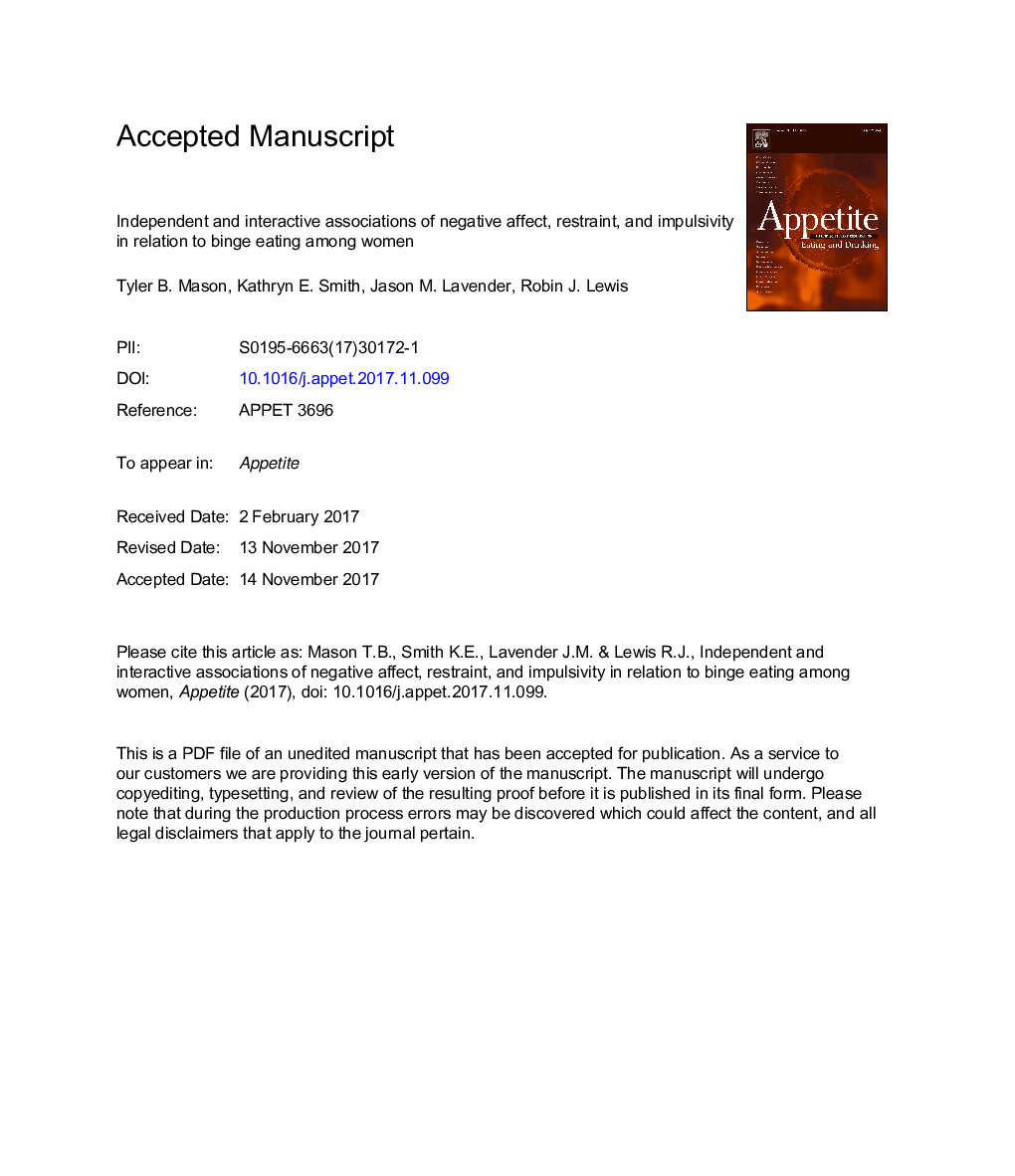| کد مقاله | کد نشریه | سال انتشار | مقاله انگلیسی | نسخه تمام متن |
|---|---|---|---|---|
| 7306425 | 1475359 | 2018 | 29 صفحه PDF | دانلود رایگان |
عنوان انگلیسی مقاله ISI
Independent and interactive associations of negative affect, restraint, and impulsivity in relation to binge eating among women
ترجمه فارسی عنوان
ارتباطات مستقل و تعاملی منفی، محدودیت و تکانشگری در ارتباط با خوردن غذا در میان زنان
دانلود مقاله + سفارش ترجمه
دانلود مقاله ISI انگلیسی
رایگان برای ایرانیان
کلمات کلیدی
خوردن غذا، تأثیر منفی، تکانشی، محدودیت رژیم غذایی،
ترجمه چکیده
شناخت رو به رشدی وجود دارد که تکانشگری ممکن است بعنوان یک عامل خطر اصلی برای خوردن غذا باشد. علاوه بر این، ارتباط تکانشگری با غذا خوردن ممکن است با سایر عوامل خطر عاطفی و شناختی تعدیل شود. در این تحقیق، ارتباطات مستقل و تعاملی از تأثیر منفی، محدودیت غذایی و جنبه های تکانشگری با خوردن نوشیدنی مورد بررسی قرار گرفت. یک نمونه متنوع از 566 دانشجوی کارشناسی، پرسشنامه های آنلاین متغیرهای مطالعه را تکمیل کرد. نتایج نشان داد که اثر متقابل منفی، محدودیت غذا و تکانشی بودن توجه در رابطه با خوردن غذا خوردن سه طرفه است. زنان بالای هر یک از این سه متغیر، بیشترین میزان خوردن غذا را گزارش کردند. علاوه بر این، یک تعامل دو طرفه برای تأثیر منفی و تکانشی غیرطبیعی در رابطه با خوردن غذا خوردن یافت شد، به طوری که تکانشگری غیرطبیعی ارتباط بین تأثیر منفی و خوردن غذا را تقویت کرد. جنبه های توجه و غیر برنامه ریزی تکانشگری ممکن است به عنوان یک عامل خطرناک در سطح صفات عمل کنند که با ریسک عاطفی و / یا شناختی (مثلا تأثیر منفی، محدودیت تغذیهای) برای پیش بینی تغذیه با الکل تغییر می کند.
موضوعات مرتبط
علوم زیستی و بیوفناوری
علوم کشاورزی و بیولوژیک
دانش تغذیه
چکیده انگلیسی
There is growing recognition that impulsivity may serve as an underlying risk factor for binge eating. In addition, the association of impulsivity with binge eating may be moderated by other affective and cognitive risk factors. This study examined independent and interactive associations of negative affect, dietary restraint, and facets of impulsivity with binge eating. A diverse sample of 566 undergraduate women completed online questionnaires of study variables. Results revealed a three-way interaction of negative affect, dietary restraint, and attentional impulsivity in relation to binge eating. Women who were high on each of these three variables reported the greatest levels of binge eating. In addition, a two-way interaction was found for negative affect and nonplanning impulsivity in relation to binge eating, such that nonplanning impulsivity strengthened the association between negative affect and binge eating. Attentional and nonplanning facets of impulsivity may function as an underlying trait-level risk factor interacts with affective and/or cognitive risk (e.g., negative affect, dietary restraint) factors to predict elevated binge eating.
ناشر
Database: Elsevier - ScienceDirect (ساینس دایرکت)
Journal: Appetite - Volume 121, 1 February 2018, Pages 147-153
Journal: Appetite - Volume 121, 1 February 2018, Pages 147-153
نویسندگان
Tyler B. Mason, Kathryn E. Smith, Jason M. Lavender, Robin J. Lewis,
